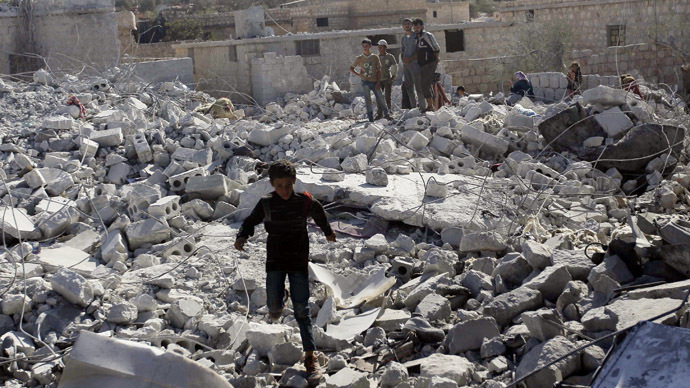Islamic State has been a key foreign policy instrument for the US and a number of its allies and become one of the main drivers of the rebellion in Syria, Charles Shoebridge, security analyst and former British army officer, told RT.
RT:The US has one of the most powerful intelligence services in the world, but reports suggest it's not robust enough to target jihadists and safeguard civilians. How's that possible?
Charles Shoebridge: It is certainly true; it is paradoxically true because if one looks that the facilities and resources available to the United States in terms of for example satellite imagery, high-level aircraft reconnaissance and the interpretation resources together with its signals intelligence and so on all which help to pinpoint what is happening on the ground. Combine that with the very high-tech precision weapons that the US has. But nonetheless still civilian casualties will take place. And the reason for that is that simply when force is applied with high explosives in large amounts as it is happening with these US, British, and other airstrikes, civilian casualties are almost inevitable. We have seen that for example in Israel in the case of Gaza, where they again have great intelligence resources, great amounts of precision weaponry and yet of course killed vast number of civilians. It looks like the US, to be fair, is giving a lot more thought to care in terms of its targeting than was the case in Israel. Nonetheless, when you have this kind of campaign, particularly since much of it is going to take place in built-up areas as ISIS, for example, disperses as it responds increasingly to these airstrikes by, of course, mixing with the civilian population. Then civilians will continue to be killed. It is a feature of this kind of airstrike.
RT:If the US now says it can't ensure civilians' safety in its air strikes against the Islamists. How significant a number might those innocent losses now be?
CS: Yes, it depends very much on how long this continues and also how the US adopts its policies in respect of targeting Islamic State. What we are seeing at the moment from the US, and indeed from the UK is vast amounts of expenditure, using pretty much high-altitude airstrikes, using expensive missiles to hit what actually are so far in the main quite low value targets. Increasingly these videos that are being released show dramatic impacts which are taking out small vehicles or what are being call command posts, gun positions and do show the actual ineffectiveness of this kind of air campaign against a group like ISIS. Arguably a much better option would be to use gunships such as the Russian supplied helicopters that Iraq has in fact ordered or indeed Apaches that the US and the UK have used quite effectively arguably in Afghanistan and in Iraq before. But these cannot be used against ISIS so much because there is probably a fear that weapons system such as man-portable air defenses systems have been supplied to jihadists on the ground in Syria by US allies in the region.
RT:Obama has said earlier that his intelligence services underestimated the power of Islamic State. Has that surprised you?
CS: I think it is surprising that Obama came up and said that when many would argue that it is not the case. Even in public, for example, congressional hearings have revealed the extent to which there was at least among some policy makers and certainly intelligence officials in the US going back some time a degree of concern over the rise of the IS that was becoming out of the control. I think it is more the factor in relation to whether it was desirable for American foreign policy purposes not to have this situation. After all IS, ISIS, ISIL, whatever one wants to call it, and indeed it’s forerunner names has been quite a useful tool for US, Saudi, and Israeli foreign policy. After all, it has been one of the main drivers of the rebellion in Syria. It has also been used to put pressure on the number of US and other allies, for example Jordan and Iraq itself. Obama came out about two months ago and actually made a comment – whether it was a slip of the tongue or not, it was reported. He said that he hadn’t tackled ISIS earlier with the airstrikes in Iraq because he didn’t want to take the pressure off the then Prime Minister Maliki. On the one hand, ISIS overreached themselves by killing American and British civilians and also they have taken very large amounts of ground now in Iraq whilst they were simply causing chaos, and havoc, and destruction in Syria and outside Syria. It was useful for them to be ignored by the US.
The statements, views and opinions expressed in this column are solely those of the author and do not necessarily represent those of RT.
The statements, views and opinions expressed in this column are solely those of the author and do not necessarily represent those of RT.

